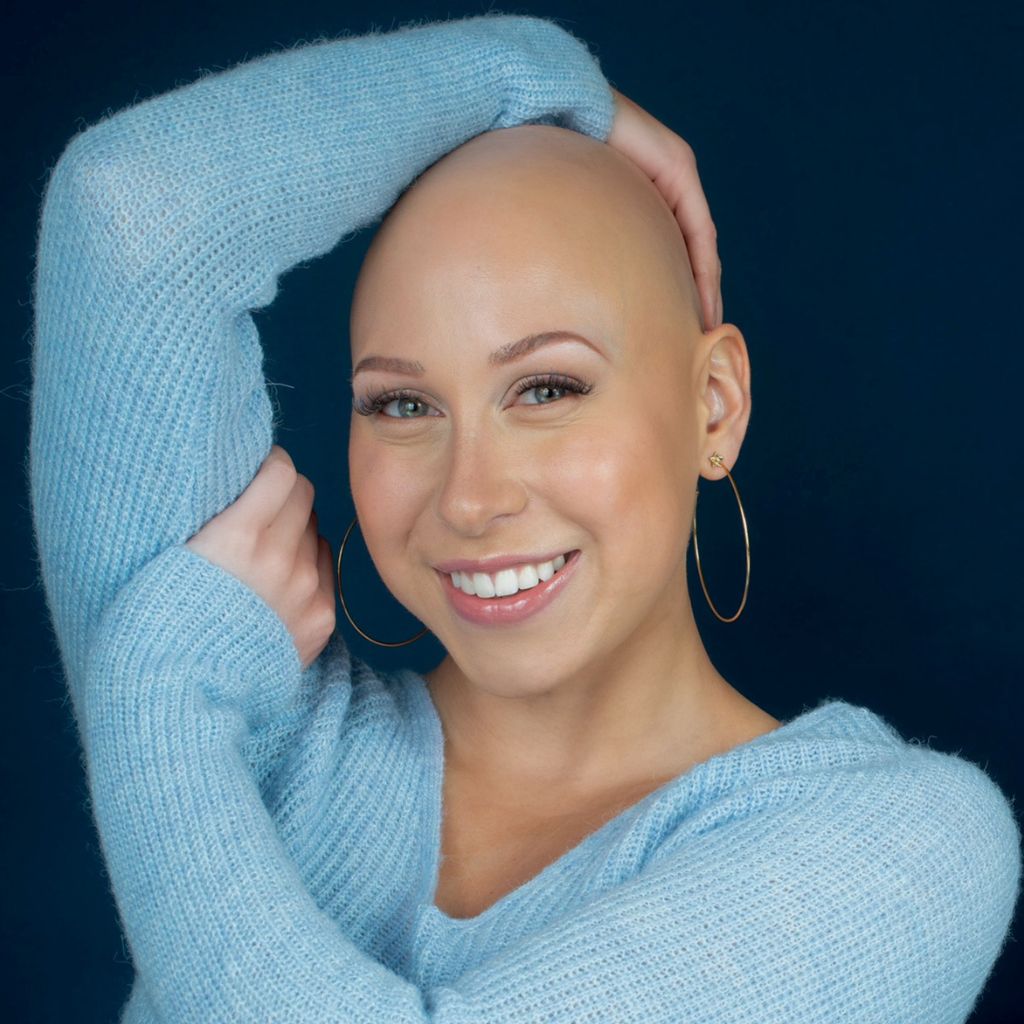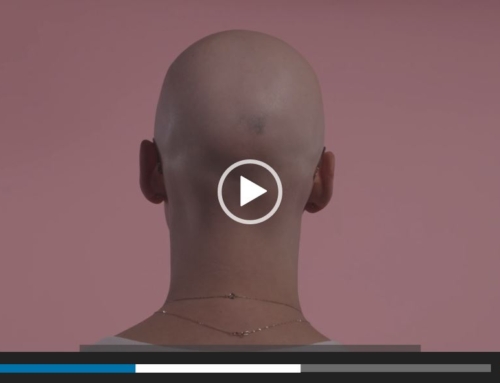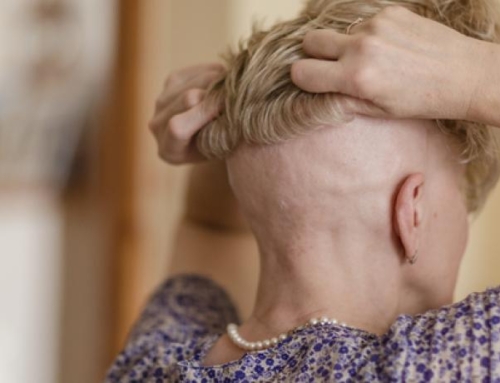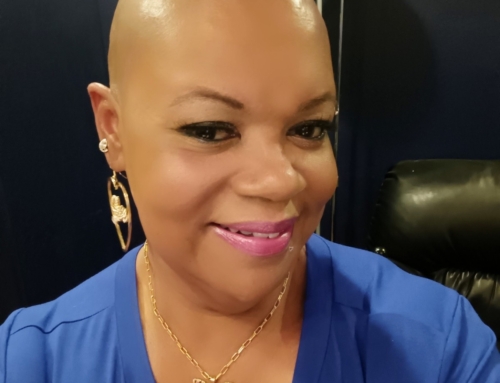Burlington woman braves baldness to build awareness of alopecia
This article was originally published in the Burlington Today on Julie Slack
In a society that focuses on beauty, it’s tough to be a bald young woman.
Lauryn Harrison is braving baldness to let the world know that you can accomplish your dreams – even without hair.
The 23-year-old Burlington resident has no hair – head, eyelashes, or eyebrows.
Diagnosed with alopecia areata at three-and-a-half years old, she, with the help of her mom Carolynne Harrison used clever hairstyles to disguise the loonie-sized patches of hair loss.
But at 13, as she was about to enjoy her Christmas break, she lost all her hair. Puberty is a challenging time for anyone – especially in a society that is filled with social media posts.
It wasn’t easy, Lauryn said, and only as she got older did she gain the confidence to embrace being bald with candor.
Alopecia areata is a condition that develops when the immune system attacks its hair follicles, confusing healthy cells for invaders, leading to hair loss. It affects about 2 per cent of the population and doesn’t discriminate against male or female.
Her biggest advocate, Carolynne, found the support of the non-profit group Canadian Alopecia Areata Foundation (CANAAF, founded in 2008), where she’s been president for five years. Lauryn is the secretary. Her father Richard, who has been there every step of the way, is also a volunteer with CANAAF.
The two of them are excited to help others and they’ll do just that at CANAAF’s 11th edition of the Come Together Conference, Canada’s largest support and awareness event for families affected by alopecia areata. It takes place Friday, July 21 to Sunday, July 23, at the Crowne Plaza Fallsview in Niagara Falls.
Families travel from across Canada to attend the weekend conference that offers a way to connect with others who understand the complexity of alopecia areata, providing a chance to exchange ideas, receive support and advice. Registration for the conference is now open: www.canaaf.org/conference/
“It’s an opportunity to connect, learn, and share experiences with others who face similar challenges,” said Carolynne. By coming together, we can collectively navigate the path of alopecia, finding strength, hope, and a renewed sense of empowerment.”
The conference will address physical, emotional, and psychological well-being for those with alopecia and their families. From educational sessions and workshops to recreational activities and social events, every aspect of the conference has been curated to address the needs of each age group.
Actress Jada Pinkett Smith revealed she had the disease in 2018. And even though it’s getting more publicity these days, there’s no cure for it.
For Lauryn, it’s been a battle and each day is tough.
“I feel empowered, which is not something I thought I would be able to feel,” she said. “But I still feel that it is an up-and-down kind of journey. Just needing to meet the day with that confidence of owning the bald head and the hairlessness can still be a hard pill to swallow as a female, as a young woman.
“It’s still very much a part of our identity and everything that we present. But I feel now like I have a chance every day to work on accepting the situation and creating a more empathetic lens to see the world through.”
That’s a huge hurdle and people could only imagine what it would be like to be bald.
“It’s a very human experience. I find it elicits a lot of raw emotions sometimes,” said Lauryn, who graduated summa cum laude from McMaster University with a commerce degree recently. “For me, I was ashamed of it for so many years, and it is still a challenge to cope with the vulnerability.”
“What I’ve noticed is that if you don’t disclose, or you’re not vocal, about what it is you have, the perception is that you are sick,” said Lauryn, who was a competitive dancer for 10 years before joining the Burlington Teen Tour Band as majorette (baton) for five years.
She focuses on helping others, and just last year, she wrote a children’s book that was used at the conference.
“I wrote it as a rhyming book, like a colouring book resource,” she said, adding that the book – We’re Unique – could be brought into a classroom or used by friends and family to help kids relate to alopecia and build their confidence by seeing themselves represented in a book.
She also hosts a passion project: Alopecia’s Audacity Podcast. There, she hopes to spread awareness, and she can even share some amusing stories.
“At first I was hesitant to step into this role,” she says. “I didn’t think it was going to be a fit for me.”
But soon, she was podcasting with two others about light-hearted things such as having tiny hairs regrow on her ears from time to time.
“It’s all about the unpredictable nature of alopecia,” she said, adding she’s getting used to the vulnerability of it. “I talk about the things that are funny, and the challenge of understanding a very complex autoimmune disease.”
Carolynne said her daughter had her eyebrows microbladed on, and growing up, she wore a wig most of the time.
“These days, she’s getting more comfortable braving her baldness and that takes courage and self-confidence,” Carolynne said. “She battles anxiety, depression and feelings of shame that affect everyday activities.
“As a caregiver and parent, you feel guilty and powerless. There’s no health Canada or FDA-approved treatment for it. We tried everything: topical steroid ointments on her head, injections into her scalp at 11 years old. One thing we say about kids with alopecia is that they are extremely resilient people.”
Lauryn took that to a whole new level. They would travel to Sunnybrook Hospital at 6 a.m. to have the treatment (toxic to those administering it) applied to her scalp. It was intended to create an allergic reaction to distract the immune system, but it didn’t work. Instead, it affected her lymph glands, causing her to develop flu-like symptoms.
Carolynne said there’s a medication that’s approved in the United States that is an extremely strong immunosuppressive medication and they’re trying to get it approved in Canada, but even then, once you stop taking it, the hair will fall out.
Because alopecia is such a little-known condition, it was important for this mother daughter duo to be able to help support others. They’re both huge boosters of CANAAF, which has 1,500 members across the country, and hope to create even more awareness so that newly diagnosed people can talk to someone who can relate and offer support.
“Our big aim is to create awareness. We’ve had people say to us that they wish they found us before. The major thing about this conference is people meeting each other,” Carolynne said. “My daughter had never met anyone with alopecia. It (the organization) was very empowering for her, and for us as parents to get that support.
Carolynne said there are aspects of the condition that are not often considered. For instance, she said, it’s very difficult to live without eyelashes and nose hairs. Windy and dusty environments can be difficult to live with and a wig comes with more issues: the wind can take it off, they’re expensive ($2,000 to start); they say wigs last forever, but not when they’re worn every day, and insurance companies often coveronly a portion of the cost of one wig in a lifetime.
“It was considered a cosmetic condition for many years; people would look at it and say it’s only hair,” Carolynne said, adding it’s difficult to put fake eyelashes on an eyelid with no hairs to help.
Alopecia affects the entire family. “You feel helpless and a sense of guilt and you want to try to do everything you can and be supportive and accepting,” Carolynne added. “That’s why both Lauryn and I volunteer for (CANAAF). We found great comfort in the organization, and we were happy to help support other families, newly diagnosed.”
Carolynne said her daughter was bullied in school when she was younger. “We found out later that one of the girls thought it was contagious,” she said; another reason awareness is so important.
Highlights of this year’s conference include support sessions, a kids’ camp, teen activities, a wig-styling demonstration and a family dance party. In addition, attendees can join a group excursion aboard the Falls Fireworks Cruise and enjoy an afternoon of fun at the Fallsview indoor waterpark.
Another highlight of the conference is guest speaker Chi Nguyen, a finalist on The Great Canadian Baking Show, who lives with alopecia.
Registration for the conference is now open: www.canaaf.org/conference/
CANAAF is run by a volunteer board of directors and the foundation welcomes donations. https://www.canaaf.org/donate/.





